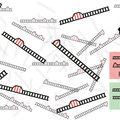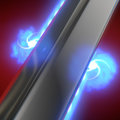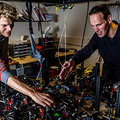Archive
15 February 2018
Programming on a silicon quantum chip
Quantum technology makes a great leap forward. While scientists can control a few qubits with great reliability, it doesn’t yet look like a real computer. Useful quantum chips require programmability: the ability to perform an arbitrary set of operations. Scientists from QuTech in Delft have now realised a programmable two-qubit quantum processor in silicon successfully implementing two quantum algorithms. They have published their work in the magazine Nature.
15 February 2018
Virtual tour of the catalysis lab
The new industrial catalysis lab is still under construction, but a few colleagues were already able to go for a walk inside the building last Monday. In 3D virtual reality, that is. A nice and very useful experience, as it turned out!
07 February 2018
Mathematics explains why Crispr-Cas9 sometimes cuts the wrong DNA

The discovery of the Cas9 protein has been of great value to medical science. It has simplified gene editing tremendously, and may even make it possible to eliminate many hereditary diseases in the near future. Using Cas9, researchers have the ability to cut DNA in a cell to correct mutated genes, or paste new pieces of genetic material into the newly opened spot. Initially, the Crispr-Cas9 system seemed to be extremely accurate. But unfortunately, it is now apparent that Cas9 sometimes also cuts other DNA sequences similar to the exact sequences it was programmed to target. Scientists at Delft University of Technology have developed a mathematical model that explains why Cas9 cuts some DNA sequences while leaving others alone.
01 February 2018
'Microbial Physiology and Fermentation Technology' course celebrates 30th birthday
This year, BioTech Delft organised the Microbial Physiology and Fermentation Technology course for post-graduates for the 30th time.
01 February 2018
Clive Brown of Oxford Nanopore at Bioengineering Institute kickoff
On Tuesday 27 March, TU Delft will launch the Delft Bioengineering Institute. Main speaker is Clive Brown, Chief Technology Officer at DNA sequencing specialist Oxford Nanopore Technologies.
25 January 2018
From spin to light: two Delft scientists separately bring together two worlds

Two groups of scientists from TU Delft in the field of quantum nanotechnology have, independently of one another, found a way to convert spin information to light. The groups are led by professors Kobus Kuipers and Lieven Vandersypen, who both work at the Kavli Institute of Nanoscience. Their research has been published in Science. The discovery by Kuipers can lead to green ICT, for example energy-efficient data processing in data centres. The aim of Vandersypen's research is to allow large numbers of qubits on a chip to work together, bringing the quantum computer one step closer.
25 January 2018
Researchers from TU Delft combine spintronics and nanophotonics in 2D material
Spintronics in materials of just a few atoms thick is an emerging field in which the ‘spin’ of electrons is used to process data, rather than the charge. Unfortunately, the spin only lasts for a very short time, making it (as yet) difficult to exploit in electronics. Researchers from the Kavli Institute of Nanoscience at TU Delft, working with the Netherlands Organisation for Scientific Research’s AMOLF institute, have now found a way to convert the spin information into a predictable light signal at room temperature. The discovery brings the worlds of spintronics and nanophotonics closer together and might lead to the development of an energy-efficient way of processing data, in data centres, for example. The researchers have given an account of their results in Science.
25 January 2018
Quantum race accelerates development of silicon quantum chip
15 January 2018
Majoranas on the rise
In 2012, the world of physics was rocked by the first observation of the exotic Majorana quasiparticle, in Leo Kouwenhoven’s laboratory. These particles are a promising candidate for robust quantum bits in a topological quantum computer of the future. A major challenge that lies ahead is how to manufacture usable, error-free quantum chips. By using new manufacturing methods, researchers from QuTech, in collaboration with TU Eindhoven, have successfully observed Majoranas in significantly improved conditions. This rules out alternative explanations and also represents another step towards the topological quantum computer of the future. The researchers published their findings today in Nature Nanotechnology.
21 October 2015
Loophole-free Bell test TU Delft crowns 80-years-old debate on nature of reality: Einsteins “spooky action” is real
